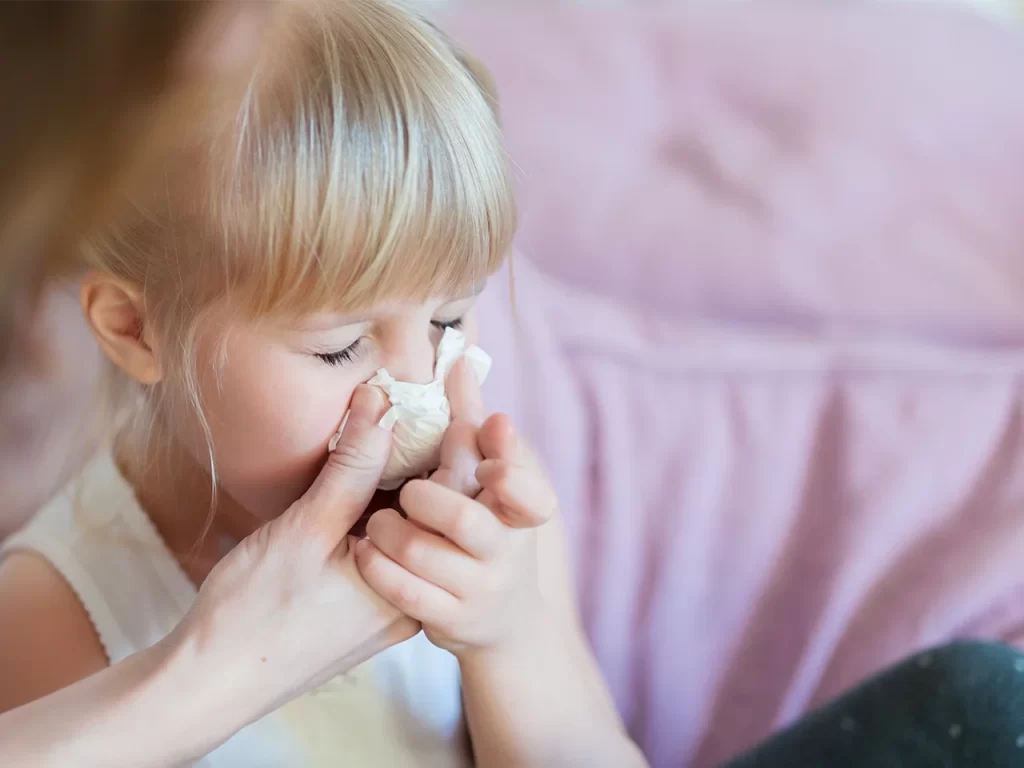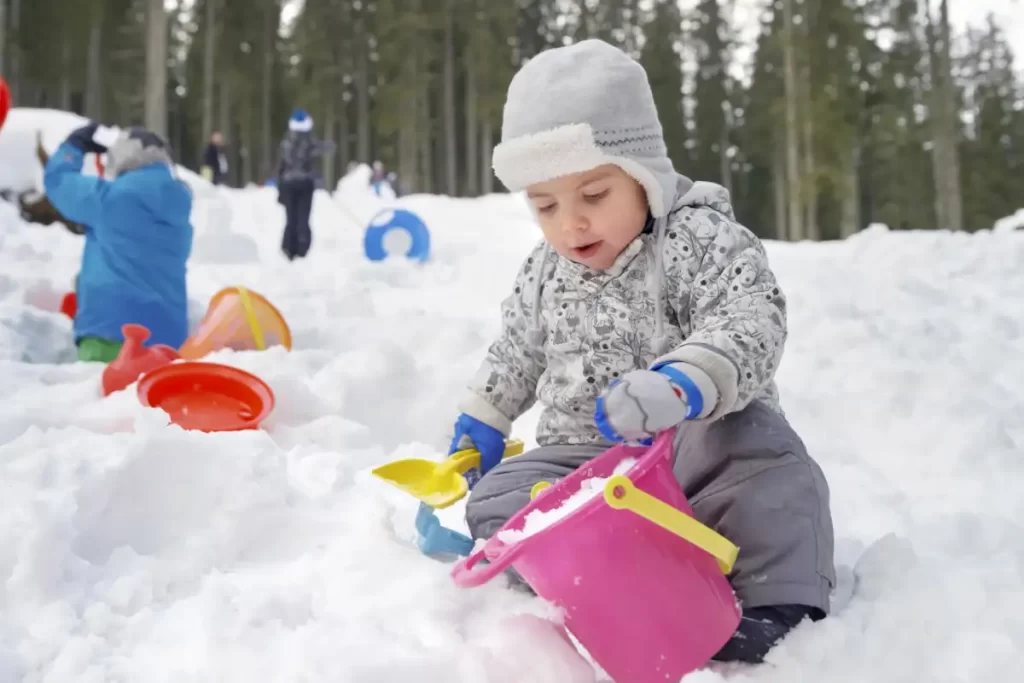A winter baby can be healthy due to the numerous benefits of the season, such as reduced exposure to allergens and improved air quality due to less pollen and pollutants. Additionally, spending time outdoors in cooler temperatures can boost their immune system and decrease the risk of certain infections.
The cold weather can also promote better sleep and restfulness, which is crucial for a baby’s overall health and development. Moreover, winter babies tend to have a stronger bond with their parents as they spend more time indoors together, fostering emotional well-being.
Taking necessary precautions like layering clothing and ensuring proper warmth can ensure a winter baby remains healthy during the season.
Importance Of Boosting Your Baby’s Immunity In Winter
Boosting your baby’s immunity in winter is crucial for their overall health. Protect them from common illnesses by providing a balanced diet, keeping their surroundings clean, and ensuring they get enough sleep.
Understanding The Vulnerability Of Babies During The Cold Season
Babies are more vulnerable to illnesses during the cold season. Their immune systems have not fully developed, making them more susceptible to infections and diseases. With the drop in temperature, viruses thrive and spread rapidly, posing a significant risk to your little one’s health. It’s important to understand the vulnerability of babies in winter to take necessary precautions and protect their well-being.
Why It’s Crucial To Focus On Immune-boosting Strategies
Boosting your baby’s immunity during winter is crucial to help them fight off common colds, flu, and other infections. A strong immune system not only aids in preventing illnesses but also ensures a faster recovery if your baby does fall sick. By focusing on immune-boosting strategies, you can provide your baby with the necessary tools to stay healthy and combat seasonal illnesses effectively.
Exploring The Long-term Benefits Of A Strong Immune System
A strong immune system in infancy sets the foundation for your baby’s long-term health. Research suggests that babies with a robust immune system are less likely to develop allergies, asthma, and other chronic conditions later in life. By investing in boosting your baby’s immunity during winter, you can help protect their health for years to come.
There are various ways you can boost your baby’s immune system in winter. Consider implementing the following strategies:
- Ensure your baby receives proper nutrition through breast milk or a well-balanced formula. Breast milk is rich in antibodies that help strengthen their immunity.
- Create a clean and hygienic environment for your baby by regularly sanitizing toys, surfaces, and their living space. This helps reduce their exposure to harmful bacteria and viruses.
- Promote good hygiene practices by washing your hands frequently and encouraging others to do the same before handling your baby.
- Bundle up your baby properly to keep them warm and protected from the cold weather.
- Limit your baby’s exposure to crowded places, especially during peak flu seasons, to minimize the risk of infections.
- Consider consulting with your paediatrician about age-appropriate supplements to further support your baby’s immune system.
- Encourage regular physical activity as it helps improve circulation and boosts the immune system.
By implementing these immune-boosting strategies, you can help strengthen your baby’s immune system, ensuring their health and well-being during the winter season and beyond.
Healthy Diet For Winter Babies

Winter can be a challenging time for parents, especially when it comes to ensuring that their little ones stay happy and healthy. One key aspect of this is providing a healthy diet that supports their growing bodies and boosts their immune system. In this article, we will explore the nutritional requirements for infants during winter and how to incorporate immune-boosting foods into their diet. We will also provide you with some easy and delicious recipes and meal ideas that will support your immune system, helping you keep your winter baby healthy and thriving.
Nutritional Requirements For Infants During Winter
The chilly winter weather means that babies need extra nutrition to stay warm and healthy. During this time, it is important to focus on providing them with a balanced diet that includes all the essential nutrients they need. Here are some key nutritional requirements for infants during winter:
- Vitamin C: This powerful antioxidant helps boost the immune system and fights off winter illnesses. Citrus fruits, strawberries, kiwis, and broccoli are excellent sources of vitamin C.
- Vitamin D: With limited exposure to sunlight during winter, it’s important to ensure your baby gets enough vitamin D for bone development. Breast milk or formula may not provide sufficient amounts, so consult your paediatrician about vitamin D supplements.
- Iron: Iron is crucial for your baby’s brain development and overall growth. Include iron-rich foods like fortified cereals, lean meats, beans, and tofu in their diet.
- Omega-3 fatty acids: These healthy fats support brain development and reduce inflammation. Incorporate foods like fish (ensure it’s safe for babies), chia seeds, and flaxseeds into your baby’s diet.
Incorporating Immune-boosting Foods In Your Baby’s Diet
In addition to meeting their nutritional requirements, it’s essential to incorporate immune-boosting foods into your baby’s diet. These foods help strengthen their immune system and protect against common winter illnesses. Here are some immune-boosting foods to include:
- Yoghurt: Contains probiotics that support a healthy gut and boost immunity. Look for plain, unsweetened yoghurt and avoid those with added sugars or flavours.
- Berries: Packed with antioxidants, berries help strengthen your baby’s immune system. Serve them fresh or add them to nutrient-rich smoothies.
- Garlic: Known for its immune-boosting properties, garlic can be added to soups, stews, or mashed veggies for added flavour and health benefits.
- Spinach: This leafy green vegetable is rich in vitamins and minerals that support the immune system. Steam or puree spinach to add to your baby’s meals.
Recipes And Meal Ideas To Support Your Baby’s Immune System
Now that we know the nutritional requirements and immune-boosting foods, let’s explore some delicious recipes and meal ideas to support your baby’s immune system during winter:
| Meal | Ingredients | Instructions |
|---|---|---|
| Veggie-loaded chicken soup | Chicken breast, carrots, celery, spinach, low-sodium chicken broth |
|
| Blueberry chia pudding | Chia seeds, milk of choice, blueberries, vanilla extract, honey (optional) |
|
These recipes are just a starting point, and you can modify them according to your baby’s preferences and dietary needs. Remember to introduce new foods one at a time and consult your paediatrician if you have any concerns.
Vitamin D And Winter Baby’s Immunity

Boost your winter baby’s immunity with vitamin D, an essential nutrient that helps keep them healthy during the colder months.
The Role Of Vitamin D In Immunity
Vitamin D plays a crucial role in supporting your winter baby’s immunity. This essential nutrient not only helps in the absorption of calcium for strong bones and teeth but also plays a vital role in maintaining a healthy immune system. Vitamin D enhances the function of immune cells, making them more efficient in defending the body against infections and illnesses. Lack of adequate vitamin D during the colder months can weaken your baby’s immune system and make them more susceptible to common winter ailments such as colds, flu, and respiratory tract infections.
Safe Ways To Provide Adequate Vitamin D During Colder Months
During winter, when sunlight exposure is limited, it can be challenging for infants to get enough vitamin D naturally. Here are a few safe and effective ways to ensure your winter baby receives adequate vitamin D:
- Supplement with vitamin D drops: Talk to your paediatrician about recommended vitamin D supplements for your baby. Vitamin D drops are specifically designed for infants and can be easily administered.
- Expose your baby to sunlight: Whenever possible, take your baby outside during the sunniest part of the day. Exposing your baby’s skin to sunlight for at least 10-15 minutes can help their body produce vitamin D naturally. Make sure to follow safety guidelines, such as avoiding direct sunlight during peak hours and protecting your baby’s delicate skin with lightweight clothing and hats.
- Consider fortified foods: Some foods are fortified with vitamin D, such as infant cereals, formula, and certain dairy products. Check the labels and choose products that provide additional vitamin D.
Tips For Increasing Vitamin D Levels In Your Baby’s Diet
Ensuring a balanced diet for your baby is essential for their overall health and development. Here are a few tips to boost your baby’s vitamin D levels through their diet:
- Introduce fortified baby cereals: Start introducing iron-fortified cereals to your baby’s diet around 4-6 months of age. Look for brands that also provide vitamin D to give your baby an extra boost.
- Incorporate fatty fish: Include fatty fish such as salmon or tuna in your baby’s diet once they are ready for solid foods. These fish are not only a good source of protein but also contain vitamin D naturally.
- Offer fortified dairy products: As your baby transitions to solid foods, incorporate fortified dairy products like yoghurt and cheese, which can contribute to their vitamin D intake.
Remember, it’s important to consult with your paediatrician before making any changes to your baby’s diet or introducing new supplements. By ensuring adequate vitamin D intake during the winter months, you can help support your baby’s immunity and keep those winter illnesses at bay.
The Power Of Breast Milk For Winter Babies
In the chilly winter months, it’s crucial to prioritize your baby’s health and well-being. While vaccines and bundled-up clothing offer some protection, there’s an incredible natural resource that plays a vital role in strengthening your little one’s immune system – breast milk. Breastfeeding not only provides essential nutrients, but it also contains powerful antibodies that provide extra protection to combat common winter ailments. Let’s explore the ways in which breastfeeding enhances a baby’s immune system and the essential nutrients found in breast milk that strengthen their immunity.
How Breastfeeding Enhances A Baby’s Immune System
The act of breastfeeding is a remarkable way for a mother to pass on her immunity to her newborn. Breast milk is rich in live antibodies that help protect against a wide range of viruses, bacteria, and germs. These antibodies target specific pathogens and help bolster the baby’s immune response, reducing the risk of infections. Breastfeeding establishes a strong foundation for the baby’s immune system, equipping them to battle winter illnesses.
Essential Nutrients In Breast Milk That Strengthen Immunity
Breast milk isn’t just a source of hydration for babies, it’s a veritable powerhouse of essential nutrients. Some key components that contribute to strengthening a baby’s immunity include:
- Immunoglobulins, which are antibodies that specifically target harmful bacteria and viruses.
- Antioxidants, such as vitamins A, C, and E, which help protect cells from damage and support the immune system.
- Probiotics that promote a healthy gut microbiome and aid in digestion and immune function.
- Oligosaccharides, a type of complex carbohydrate that stimulates the growth of beneficial bacteria in the baby’s gut, further enhancing their immune system.
The unique composition of breast milk ensures that babies receive a well-rounded dose of essential nutrients, giving them an added immune boost during the winter season.
Solutions For Breastfeeding Challenges During Winter
While breastfeeding is a natural process, it can come with its share of challenges, especially during the winter months. Here are some solutions to common breastfeeding challenges:
- Keep your baby warm during breastfeeding sessions by using cozy blankets or nursing covers.
- Moisturize your nipples regularly to prevent dryness and cracking caused by cold weather.
- Ensure the room temperature is comfortable for both you and your baby, as extreme cold or heat can impact breastfeeding.
- Stay hydrated by drinking enough fluids to maintain an adequate milk supply.
- If you’re experiencing discomfort or difficulties with breastfeeding, don’t hesitate to seek support from a lactation consultant or healthcare professional.
By addressing these challenges, you can ensure that both you and your baby have a smooth and successful breastfeeding journey throughout the winter season.
Creating A Healthy Environment For Your Winter Baby

Creating a Healthy Environment for Your Winter Baby
When winter arrives, it’s essential to ensure that your little one is in a healthy environment. With colder temperatures and increased time spent indoors, the risk of respiratory infections and other illnesses can be higher for babies. To minimize these risks, it’s important to focus on managing indoor air quality, maintaining optimal room temperature and humidity levels, and practising effective hand hygiene. In this article, we’ll explore these aspects in detail and provide you with simple, practical tips to create a healthy winter environment for your baby.
Managing Indoor Air Quality To Reduce The Risk Of Respiratory Infections
Indoor air quality plays a crucial role in maintaining a healthy environment for your winter baby. Poor air quality can lead to respiratory issues and increase the likelihood of your baby falling prey to winter illnesses. Fortunately, there are measures you can take to improve the air your baby breathes:
- Keep your home clean: Regularly dust, vacuum, and mop your home to minimize dust and allergens.
- Use an air purifier: Consider investing in a high-quality air purifier to filter out pollutants, dust, and other harmful particles.
- Keep tobacco smoke away: Avoid smoking or allowing others to smoke indoors as secondhand smoke can be particularly harmful to babies.
- Limit the use of chemical cleaners: Opt for natural and baby-safe cleaning products to reduce exposure to harmful chemicals.
Maintaining Optimal Room Temperature And Humidity Levels
Another crucial aspect of creating a healthy environment for your winter baby is maintaining optimal room temperature and humidity levels. Babies are more sensitive to temperature changes, and extreme conditions can impact their health. To ensure your baby stays comfortable and protected, follow these tips:
- Set the thermostat at the right temperature: Aim for a comfortable room temperature around 68 to 72 degrees Fahrenheit (20-22 degrees Celsius), ensuring it is not too hot or too cold.
- Use a hygrometer: This device helps you monitor the humidity levels in your baby’s room. Aim for a range between 40% and 60% to prevent dryness or excessive moisture.
- Invest in a humidifier: In winter, the air tends to be drier, leading to dry skin and respiratory discomfort. Using a humidifier can help add moisture to the air and keep your baby’s skin and respiratory system hydrated.
Tips For Effective Hand Hygiene And Reducing Germ Exposure
Proper hand hygiene and reducing germ exposure are vital in safeguarding your baby’s health during winter. Babies explore the world through touch, putting everything in their mouths, making them more susceptible to infections. Follow these tips to protect your baby:
- Wash your hands frequently: Ensure everyone who handles your baby, including yourself, washes their hands frequently with warm water and soap for at least 20 seconds. This is crucial, especially before feeding, after using the restroom, and after being in public places.
- Keep hand sanitisers handy: When handwashing isn’t possible, use a baby-safe hand sanitiser with at least 60% alcohol content. Apply an adequate amount and rub hands together until dry.
- Limit exposure to crowded spaces: Reduce your baby’s exposure to crowded places, especially during peak flu season and when the community spread of illnesses is high.
- Follow a strict ‘no sick visitors’ policy: Request that friends and family members refrain from visiting if they are feeling unwell or have recently been exposed to contagious illnesses such as the flu or cold.
In conclusion, creating a healthy environment for your winter baby is vital to protect them from respiratory infections and other winter-related illnesses. By managing indoor air quality, maintaining optimal room temperature and humidity levels, and practising effective hand hygiene, you can greatly reduce the risks and help your baby thrive during this chilly season.
Boosting Immunity Through Sleep And Rest

Boost your baby’s immunity this winter by ensuring they get enough sleep and rest. By prioritizing their sleep, you can help support their immune system and keep them healthy all season long.
Boosting Immunity Through Sleep and Rest Sleep plays a crucial role in strengthening the immune system, and this is especially important during the winter season when your baby may be more susceptible to common illnesses. The connection between sleep and a strong immune system is undeniable. When your little one gets enough rest, their body is better equipped to fight off infections and stay healthy. Establishing healthy sleep routines for your winter baby is vital in boosting their immunity and ensuring their overall well-being. Additionally, implementing strategies to ensure proper rest and minimize sleep disruptions can go a long way in supporting their immune system. Let’s delve deeper into the importance of sleep and explore ways to create a healthy sleep environment for your baby.
The Connection Between Sleep And A Strong Immune System
Adequate sleep is essential for your baby’s immune system to function optimally. During sleep, the body releases proteins called cytokines that help fight off infections and inflammation. These cytokines are vital in combating viruses and bacteria, which are common triggers for winter illnesses. Lack of sleep not only weakens the immune system but also inhibits the production of these crucial proteins, making your baby more susceptible to falling ill. Ensuring that your baby gets enough sleep will help their immune system function at its best and provide them with a protective shield against winter ailments.
Establishing Healthy Sleep Routines For Your Winter Baby
Creating a consistent and nurturing sleep routine for your little one is key to boosting their immunity. Consider the following tips when establishing healthy sleep routines: 1. Stick to a regular sleep schedule: Set fixed bedtime and wake-up times for your baby to regulate their internal clock. This consistency helps their body recognize when it’s time to rest and promotes better sleep quality. 2. Create a soothing sleep environment: Make sure your baby’s sleep space is calm, comfortable, and conducive to restful sleep. Adjust the room temperature to a ccosy level, use blackout curtains to block out excessive light, and consider using a white noise machine to drown out any disruptive sounds. 3. Establish a bedtime routine: Develop a relaxing routine leading up to sleep time. This can include activities such as a warm bath, gentle massage, and reading a bedtime story. A consistent routine signals to your baby that it’s time to wind down and prepare their body for sleep.
Strategies To Ensure Proper Rest And Minimize Sleep Disruptions
While establishing a healthy sleep routine is crucial, there are also steps you can take to minimize sleep disruptions and ensure your baby gets the rest they need: 1. Ensure comfort: Dress your baby in appropriate sleepwear and use breathable bedding to keep them cosy without overheating. Regularly check that their sleep environment is free from any potential discomfort, such as sharp objects or excessive noise. 2. Maintain a calm sleep environment: Create a peaceful atmosphere during sleep times. Dim the lights, limit stimulation, and use soft, soothing music or lullabies to help your child relax and drift off to sleep. 3. Respond to your baby’s needs promptly: If your baby wakes up during the night, attend to their needs promptly. Address any hunger, diaper changes, or discomfort to minimize sleep disruptions. Providing comfort and reassurance can help your baby settle back into sleep more easily. 4. Limit exposure to screens and stimulating activities before bedtime: The blue light emitted by screens can interfere with your baby’s natural sleep-wake cycle. To optimize sleep quality, avoid screen time or stimulating activities close to bedtime. By prioritizing sleep and rest, you can boost your winter baby’s immunity and help them stay healthy through the season. Remember, a well-rested baby is a healthy baby, so create a nurturing sleep environment and establish a consistent sleep routine to support their overall well-being throughout the winter months.
Vaccinations And Immunizations For Winter Babies
As a responsible parent, it’s crucial to prioritize your baby’s health, especially during the winter season. By understanding the importance of vaccinations and immunizations for your little one, you can provide them with the best possible protection against preventable diseases. In this article, we will explore the significance of vaccinations, and recommended vaccines for winter babies, and address common concerns and misconceptions.
Understanding The Importance Of Vaccinations In Protecting Your Baby
When it comes to safeguarding your baby’s well-being, vaccinations play a vital role. These vaccines contain weakened or inactive viruses or bacteria that stimulate your baby’s immune system, helping them build immunity against specific diseases. By receiving these essential vaccinations, your baby develops immunity and becomes less susceptible to potentially dangerous illnesses.
Recommended Vaccines And Immunizations For Winter Babies
During the winter season, several vaccines are recommended to protect your baby from a spectrum of diseases. It is important to consult with your paediatrician to determine which vaccines are appropriate for your little one, as different countries/regions may have different vaccination schedules. However, some common vaccines recommended for winter babies include:
| Vaccine | Disease(s) Prevented |
|---|---|
| Influenza (Flu) Vaccine | Influenza |
| Pneumococcal Conjugate Vaccine (PCV) | Pneumococcal diseases, such as pneumonia and meningitis |
| DTaP Vaccine | Diphtheria, Tetanus, Pertussis |
Addressing Common Concerns And Misconceptions About Vaccinations
Vaccinations can sometimes generate concerns and misconceptions among parents. However, it’s important to rely on scientific evidence and expert opinions to make informed decisions for your baby’s health. Here, we address some common concerns and misconceptions:
- Effectiveness of Vaccines: Vaccines undergo rigorous testing to ensure safety and efficacy. They have been proven to be highly effective in preventing diseases and reducing the severity of symptoms.
- Autism and Vaccines: Extensive research has debunked the myth linking vaccines to autism. Scientific studies consistently demonstrate that there is no causal relationship between vaccines and autism spectrum disorders.
- Vaccine Side Effects: Like any medication, vaccines can have minor side effects, such as fever or soreness at the injection site. Severe side effects are extremely rare.
Natural Remedies And Supplements For Winter Baby’s Immunity

As the winter season approaches, it’s important to take extra precautions to keep your baby healthy and maintain their strong immune system. While there are various measures you can take to achieve this, exploring natural remedies and supplements can be a safe and effective way to support your little one’s immune system. In this article, we will discuss the benefits of natural remedies, the effectiveness of herbal supplements, and the importance of consulting with healthcare professionals before trying alternative options.
Exploring Natural Remedies To Support Your Baby’s Immune System
Natural remedies can play a significant role in boosting your winter baby’s immunity. These remedies often harness the power of plant-based ingredients that provide unique and beneficial properties. Here are a few examples of natural remedies:
- Elderberry syrup: Extracted from the elderberry plant, this syrup is packed with antioxidants and vitamins that can help strengthen your baby’s immune system.
- Honey: Known for its antimicrobial and anti-inflammatory properties, honey can be added to warm liquids or used as a natural sweetener for various foods.
- Garlic: This pungent bulb not only adds flavour to dishes but also contains compounds that have immune-boosting effects.
These natural remedies can be incorporated into your baby’s diet or consumed in moderation, ensuring they are appropriate for their age group. Always consult with your paediatrician before introducing any new natural remedy.
Safe And Effective Herbal Supplements For Winter Babies
In addition to natural remedies, herbal supplements can also provide a way to support your winter baby’s immune system. However, it’s crucial to choose supplements that are safe and effective for infants. Here are a few herbal supplements known for their immunity-boosting properties:
| Herbal Supplement | Benefits |
|---|---|
| Echinacea | Helps alleviate symptoms of respiratory infections |
| Chamomile | Relieves common cold symptoms, promotes relaxation |
| Ginger | Supports digestion and reduces nausea |
When considering herbal supplements, always consult with your paediatrician or a healthcare professional who specializes in natural remedies. They will be able to provide guidance on the appropriate dosage and ensure that there are no potential risks or interactions with other medications your baby may be taking.
Consulting With Healthcare Professionals Before Using Alternative Remedies
While natural remedies and herbal supplements can be beneficial for your winter baby’s immunity, it’s essential to consult with healthcare professionals before implementing them. Your baby’s paediatrician or a healthcare provider experienced in natural medicine can help assess your baby’s specific needs, provide personalized recommendations, and ensure their safety.
It’s important to note that alternative remedies may not be suitable for all babies, especially those with certain medical conditions or taking specific medications. Your healthcare provider will consider these factors and guide you in making the best decisions for your baby’s health.
By exploring natural remedies and herbal supplements, you can take proactive steps to support your winter baby’s immune system. Remember to always prioritize discussions with healthcare professionals to ensure the safety and effectiveness of any alternative options you consider.
Balancing Indoor And Outdoor Activities For Winter Babies

When it comes to raising healthy winter babies, finding the right balance between indoor and outdoor activities is crucial. While outdoor play offers numerous benefits in boosting a baby’s immunity, it is equally important to engage them in indoor activities that promote physical and mental development. In this blog post, we will explore the advantages of outdoor play, discuss indoor activities that contribute to their growth, and finally, help you strike the perfect balance for your little one during the winter season.
The Benefits Of Outdoor Play In Boosting A Baby’s Immunity
Outdoor playtime for babies during winter not only provides a refreshing change of scenery but also offers several health benefits. Here are some key advantages:
- Exposure to sunlight: Spending time outdoors exposes babies to sunlight, which is a natural source of vitamin D. This essential vitamin helps strengthen their immune system and promotes healthy bone development.
- Fresh air and ventilation: Outdoor environments provide better air quality, reducing the risk of respiratory illnesses. The fresh air also aids in better oxygen flow, enhancing brain development and overall well-being.
- Interaction with nature: Being surrounded by nature stimulates a baby’s senses and ignites curiosity. Whether they feel the texture of snow or touch tree bark, these experiences enhance their sensory and cognitive development.
- Physical activity: Outdoor play encourages physical movement, promoting gross motor skills and coordination. From crawling in the snow to playing with winter toys, your baby will have ample opportunities to engage in physical activities, keeping them active and healthy.
- Boosting immunity: Exposure to different environments and surfaces outdoors helps strengthen your baby’s immune system. By encountering various microorganisms, their immune system learns to adapt and becomes more resilient.
Indoor Activities That Promote Physical And Mental Development
While winter may limit outdoor playtime, numerous indoor activities contribute to your baby’s growth. Here are some ideas for stimulating their physical and mental development:
- Tummy time exercises: Encourage your little one to engage in supervised tummy time, which helps develop their neck, back, and core muscles. This activity also aids in their motor and sensory development.
- Sensory play: Create sensory bins using safe materials like rice, fabric scraps, or cooked pasta. This allows your baby to explore different textures, enhancing their tactile and cognitive skills.
- Reading: Reading aloud to your baby stimulates their language and cognitive development. Choose age-appropriate books with vibrant illustrations and engage them in interactive storytelling sessions.
- Music and movement: Incorporate music and movement into playtime by dancing or playing musical instruments together. This promotes their coordination, rhythm, and overall cognitive abilities.
- Building blocks and puzzles: Introduce age-appropriate building blocks and puzzles that help develop your baby’s fine motor skills, problem-solving abilities, and hand-eye coordination.
Finding The Right Balance Between Outdoor And Indoor Time During Winter
Ensuring a balanced routine for your winter baby is essential to provide them with both the benefits of outdoor play and indoor activities. Here are a few tips:
- Schedule outdoor time: Plan short outdoor sessions during the warmest hours of the day. Keep an eye on the weather forecast to ensure comfort and safety.
- Create indoor play zones: Designate specific areas indoors for various activities so your baby has defined spaces for play, reading, and quiet time.
- Rotate activities: Alternate between indoor and outdoor activities to keep your baby engaged and prevent monotony. This helps maintain their interest and enthusiasm.
- Weather-proof clothing: Invest in appropriate winter clothing for your baby, such as hats, gloves, and snowsuits. This allows them to explore the outdoors comfortably while staying warm and protected.
- Involve social interactions: Arrange playdates or join parent-baby groups to provide social stimulation for your little one. Connecting with other families also offers support and enriches their overall developmental experiences.
Recognizing Signs Of Illness And When To Seek Medical Help

Winter may bring joy with its cycles and warm sweaters, but it also brings a wave of illnesses that can affect even the tiniest members of our family. As parents, it is crucial to be vigilant and keep a close eye on our winter babies’ health. By recognizing the signs of illness and knowing when to seek medical help, we can ensure our little ones get the care they need promptly.
Common Winter Illnesses In Babies And Their Symptoms
During the winter, babies are more prone to various illnesses due to the cold weather and increased exposure to viruses. It’s essential to be able to identify the common winter illnesses and their symptoms so that we can act promptly:
| Illness | Symptoms |
|---|---|
| Cold | Nasal congestion, cough, sneezing, mild fever, sore throat |
| Influenza | Fever, muscle aches, fatigue, cough, runny nose |
| RSV (Respiratory Syncytial Virus) | Cough, wheezing, rapid breathing, fever, nasal congestion |
| Croup | Barking cough, hoarse voice, difficulty breathing, fever |
These are just a few examples of the most common illnesses that babies may experience during winter. It’s important to remember that each baby is unique, and their symptoms may vary. If you notice anything unusual or concerning, it’s always wise to consult a healthcare professional.
When To Consult A Healthcare Professional For Your Baby’s Health
Baby’s health is never something to take lightly, especially during the winter season. While some illnesses can be managed at home, certain red flags should prompt you to consult a healthcare professional immediately:
- High fever: If your baby’s temperature exceeds 100.4°F (38°C), it’s crucial to seek medical assistance.
- Difficulty breathing: Rapid breathing, wheezing, or signs of distress should never be ignored and require medical attention.
- Dehydration: If your baby is not producing tears while crying, has a dry mouth, or reduced urine output, it may indicate dehydration. Consulting a doctor is crucial in such cases.
- Persistent cough: A cough that lasts for more than a week or worsens over time should be evaluated by a healthcare professional.
Always trust your instincts as a parent – if something feels off or you are unsure, it’s better to consult a healthcare professional to ensure your baby receives appropriate care.
Tips For Managing Illness And Promoting A Speedy Recovery
Though illness can be challenging for both babies and parents, there are steps we can take to help manage and promote a speedy recovery:
- Provide plenty of rest: Allow your baby to get ample sleep to aid in their recovery process.
- Ensure proper hydration: Offer frequent feedings to ensure your baby stays hydrated.
- Use a humidifier: Keeping the air moist can relieve congestion and ease breathing difficulties.
- Follow your paediatrician’s advice: Administer medications as prescribed and follow any specific instructions provided by your healthcare provider.
- Keep the environment clean: Regularly sanitize toys, surfaces, and baby feeding equipment to prevent the spread of germs.
Remember, the road to recovery may take time, and each baby’s healing process is unique. By providing tender loving care and seeking medical help when necessary, we can help our winter babies overcome illness and thrive.

Credit: viviojunior.com
Frequently Asked Questions Of Winter Baby Is Healthy
Is It Good To Have A Winter Baby?
Having a winter baby has its advantages due to the cosy atmosphere, fewer social events conflicts, and potential cost savings on summer activities. However, it can also mean limited outdoor activities and the risk of cold and flu season. Ultimately, the choice depends on personal preference and circumstances.
What Is Special About Winter Babies?
Winter babies have a unique charm and some advantages. They get to celebrate their birthdays during the festive season, and studies suggest they tend to have lower rates of allergies and asthma. Additionally, they may have stronger immune systems due to exposure to seasonal viruses.
Is It Good To Take Baby Out In Winter?
It is generally safe to take a baby out in winter, as long as you dress them appropriately and protect their sensitive skin. Use layers, hats, mittens, and a blanket to keep them warm. However, limit outdoor time and avoid extreme temperatures.
Is It Better For Baby To Be Cold?
No, a baby shouldn’t be cold. Babies should be kept warm and comfortable to maintain their body temperature and avoid health issues.
Can A Winter Baby Be Born Healthy?
Yes, a winter baby can be born healthy. Just ensure proper prenatal care and a healthy lifestyle.
Is Winter A Good Time To Have A Baby?
Winter can be a good time to have a baby due to fewer seasonal allergies and the cosy indoor environment.
What Should I Do To Keep My Winter Baby Healthy?
Keep your winter baby warm, ensure proper nutrition, and protect them from cold and flu viruses.
Are Winter Babies More Susceptible To Illnesses?
Winter babies may be more prone to respiratory infections, but proper hygiene and regular check-ups can help prevent illnesses.
How Can I Protect My Winter Baby From The Cold?
Dress your baby in warm layers, use hats and mittens, and avoid exposing them to extreme cold for long periods.
Should I Keep My Winter Baby Indoors All The Time?
While it’s important to protect your winter baby from extreme cold, it’s also beneficial for them to get fresh air and sunlight in moderation.
Conclusion
A winter baby’s health is just as important as during any other season. With the right care and precautions, parents can ensure their little ones thrive even in the colder months. From bundling up to maintaining a warm and cosy environment, taking care of their nutritional needs, and paying attention to any potential cold-related concerns, you can ensure your winter baby stays healthy and happy.
Embrace the season and enjoy the precious moments with your baby!






Be First to Comment